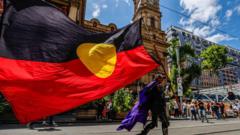An inquiry into the death of Kumanjayi Walker, who was shot by a police officer, has highlighted issues of racism and ineffective policing methods in the Northern Territory. Judge Elisabeth Armitage's findings determined that the officer acted within a system embedded with racism, sparking renewed calls for reform in policing approaches towards Indigenous populations.
Inquest Links Racism to Police Shooting of Aboriginal Teen in Northern Territory

Inquest Links Racism to Police Shooting of Aboriginal Teen in Northern Territory
A coroner’s inquest reveals systemic racism within the Northern Territory police following the fatal shooting of Indigenous teenager Kumanjayi Walker in 2019.
The police officer involved in the shooting of Indigenous teenager Kumanjayi Walker in 2019 has been labeled "racist" by a coroner's inquest, which found significant flaws in the policing approach employed by the Northern Territory (NT) police force. Walker, a 19-year-old from the remote Indigenous community of Yuendumu, died after being shot three times at close range by Constable Zachary Rolfe during a home arrest. The anticipated inquest findings reveal systemic issues that perpetuate racial disparities in law enforcement.
Judge Elisabeth Armitage, who presided over the inquest, stated in her findings that Walker's death was "avoidable" and pointed to evidence of persistent “systemic and structural racism” within the police forces in NT. Rolfe, who has since left the police force, was charged with murder but acquitted in 2022, an outcome that mobilized widespread protests highlighting ongoing concerns about Indigenous deaths in custody.
Presenting her conclusions, Judge Armitage emphasized that Rolfe was more than just a "bad apple," illustrating that racist behavior and language appeared to be normalized within the Alice Springs police station, where Rolfe was stationed. While she could not definitively attribute Walker's death to Rolfe's alleged racist attitudes, she noted the possibility could not be excluded. The judge also characterized Rolfe's mindset, suggesting that a predilection for "adrenaline-fueled policing" may have clouded his judgment during the encounter with Walker, who had a history of trauma and poor impulse control.
On the night of Walker's death, Rolfe and another officer arrived to arrest him for breaching a court order. During their attempts to apprehend him, a struggle ensued after Walker reportedly attacked Rolfe with a pair of scissors. Rolfe’s decision to fire upon Walker, particularly subsequent shots after the initial encounter, was deemed "unnecessary" by prosecutors, though his defense argued it was a crucial response to protect his partner.
Judge Armitage concluded that Rolfe's actions resulted from a "series of flawed decisions," labeling them as creating a scenario that justified the use of lethal force unnecessarily. The inquest also revealed that after shooting Walker, police officers dragged his body before administering first aid, an action deemed disrespectful by the judge.
In response to her findings, Armitage presented 32 recommendations aimed at reforming police practices, including proposals for limiting when officers carry firearms in Yuendumu and strengthening public anti-racism strategies. The inquest’s deliverables are intended to ensure accountability and foster a more respectful relationship between law enforcement and Indigenous communities.
Martin Dole, the acting commissioner for NT Police, reflected on the inquest's emotional toll, reaffirming the commitment to learning from this tragic event to prevent future occurrences. Walker’s family noted that they would carefully review the findings and recommendations as they continued to seek justice and reform in the wake of their loss.




















